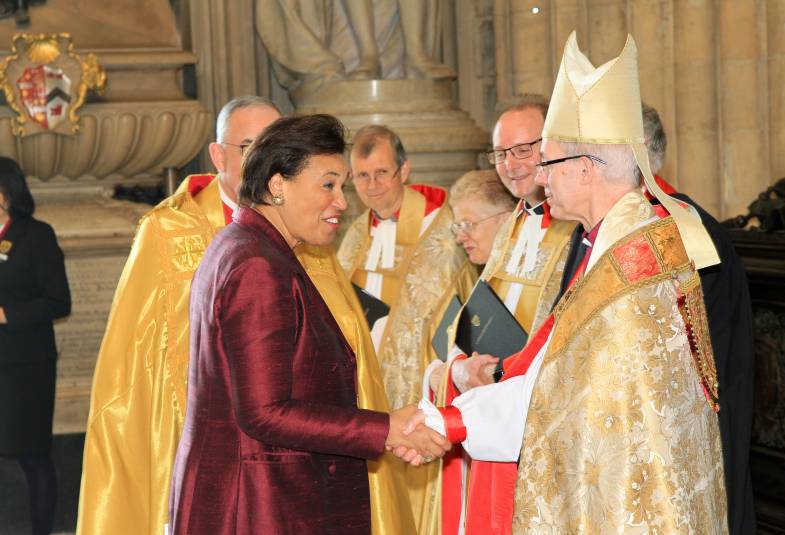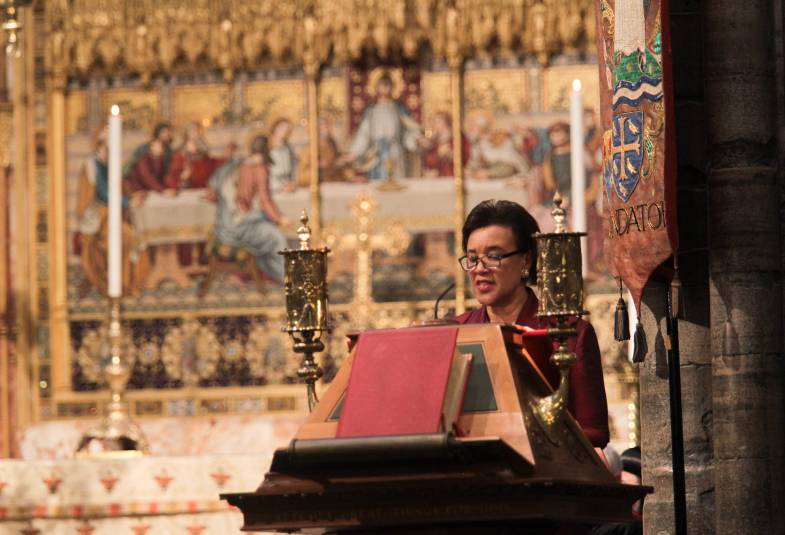Psalm 115, Ruth 1:1-18, Luke 16:19-end
First of all may I thank the Dean for his kind invitation to preach on this occasion. It’s a great privilege to be here with you.
Throughout human history the question of who I am, or who we are together, has been at the root of philosophy, of politics, of peace and of war. The Christian response is that to know God and God’s love is the only way truly to form an identity for an individual or a nation.
The book of Ruth is supremely about identity, and makes the startling claim that identity is set by God’s choice and human response, not by human descent or even by history. The parable of Lazarus and the rich man tell us that our identity in God has an eternal significance: who we are eternally depends on the choices we make now. We will either be those condemned or accepted and, as always in Luke’s account of Jesus, it is the outsider who has the eternal identity with God, and the rich and the powerful who are truly lost and outside.
The Book of Ruth is set at a time of chaos and disorder. The last verse of Judges, the previous book, says that at this time all the people did what was right in their own eyes. The first verse of Ruth says that the Book of Ruth happened at a time when Judges ruled. When all did what was right in their own eyes.
Every government represented here dreads anarchy: the outbreak of disorder, when all do only what is right in their own eyes. Many of the countries in the Commonwealth have experienced anarchy, either within their own borders or in neighbouring states.

For some it is a recent experience, or even a current one. Even here in the United Kingdom we have recent experience of terrorism on our streets. Many people are within living memory of bombs raining down, and of the ultimate horrors of Europe dominated by evil, destroying innocent lives.
Ruth’s identity, and that of her mother-in-law, seem set firm at the beginning of the book as mutual and ancient enemies. Ruth was from Moab, Naomi from Israel. Yet, as often happens today, Naomi and her husband and children were forced into exile by food insecurity.
As often happens today they went where they could and married the ones that accepted them. Refugees are nothing new, nor is their suffering unique to our time. Yet, as often happens today, one unhappiness follows another, and the widowed and childless Naomi, without support, seeks to return home.
This is where it all changes; or at least the identity of Ruth changes. In the providence and power of God, whom at this stage she does not know, she commits herself to the one, true God, and finds a new identity. By the end of the book, four short chapters, God has restored her and Naomi, and Ruth has become the grandmother of the great King of Israel, David. Israel’s great King is thus of mixed ethnic background, but one identity: he has one call, one God, one obedience to God in ups and downs, faced with his own sin and with his great courage and faith.
Ruth’s story tells us that identity – for each of us and all of us – is not formed genetically, but through the transformation of faith and obedience to God.
Nor is identity formed economically. The rich man has apparently succeeded. He has no fears, but his identity is built on nothing beyond wealth. In God’s judgment he is poorer than the beggar Lazarus; he does not even have a name. What we have in this world does not give us identity.
Identity in all ages, including our own, is often formed as a negative, by contrast with others, especially by hatred of others. That too is familiar in the Commonwealth. We also see it across Europe in this age, in this generation, in this very year, where fears of immigration, fears of other faith groups – worse still the evil, ancient false fear of the Jewish people – are used as a way of uniting other people.
We know in Europe from our own experience that Hitler did this most ruthlessly and with unparalleled wickedness. We must have the humility, in speaking to the Commonwealth, of recognising our own history.

It is the grand temptation of politics: how do we create identity for our own party, our own ethnicity, our own nation? Sometimes it is through force, as in the Empires, happily past for the most part. Or it may be through fear of the other. Many fall into the temptation of securing their future, at least in their own eyes, with the use of money, often corruptly obtained.
The Psalmist, in that beautifully sung Psalm 115, tells us the fate of all such approaches. The sarcasm drips from those middle verses. If we have idols in this world they will not help us – for they cannot walk, they have eyes but they cannot see, ears but they cannot hear. They cannot take action. Worse still, if any of us allow idolatry in our own lives, whether of success, or money, or power – or our own self-formed identities – we will become as incapable as the idol itself.
There is no identity for the human being except the identity which comes from God. There is no escaping judgement except through lives that find their identity in faith and obedience to God. The only sign of such obedience and faith is the way we behave, and the Bible sets that out in the clearest terms. It is to raise up the poor, to bring freedom to the captives, to lighten the load of the suffering.
So here lies the challenge for the Commonwealth. It is a body of extraordinary and wonderful diversity springing from a shared history, and shared aspirations. Because it bridges the great gulf between rich and poor, secure and threatened, whether by climate change, war, movements of people or terrorism, it has the potential to deepen a unique identity.
It cannot be an identity set by national borders, for the Commonwealth reaches around the world. It cannot be an identity set by ethnic character, for the Commonwealth is utterly diverse.
It cannot be an identity even set by faith, although the vast majority of its citizens are the followers of one faith tradition or another. Its future is, thank God, not controlled by its history, for that is mixed. And its identity is not defined economically.
The Commonwealth will last, and will find its identity more and more deeply even than today. Its future will be a blessing to the world – rich and poor, secure and threatened – if it is a body that loves the poor, brings home the refugee, cares for the stranger, eliminates unjust gain and corruption, guards the environment, and does so amidst diversity held together by a common humanity, and a vision of hope.
Such a vision answers the needs of our time. Liberates the oppressed. It guards freedom of conscience and belief, and sets the names of its leaders before the history of the world.
Mere talking will not do it, as Ruth knew, and as Abraham told the rich man. This is a time for action in love, for hope founded in faith, for humility of service that imitates the risen Christ we worship here today. Amen.
Find out more about the Commonwealth Heads of Government Meeting 2018